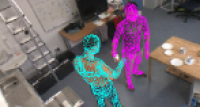Research
The AICOR Institute for Artificial Intelligence investigates methods for cognition-enabled robot control. The research is at the intersection of robotics and Artificial Intelligence and includes methods for intelligent perception, dexterous object manipulation, plan-based robot control, and knowledge representation for robots.
Robots performing complex tasks in open domains, such as assisting humans in a household or collaboratively assembling products in a factory, need to have cognitive capabilities for interpreting their sensor data, understanding scenes, selecting and parametrizing their actions, recognizing and handling failures and interacting with humans. In our research, we are developing solutions for these kinds of issues and implement and test them on the robots in our laboratory. A particular focus of the group is on the integration of individual methods into complete cognition-enabled robot control systems and the release of the developed software as open-source libraries.
Collaborative Projects
 |
FAME: In the ERC Advanced Grant project “FAME“ (Future-oriented cognitive Action Modelling Engine) we will investigate how autonomous robots can understand everyday manipulation tasks and develop the skills to accomplish them successfully. The realization of computational models for performing everyday manipulation tasks for any object and any purpose would be a disruptive breakthrough in the creation of versatile, general-purpose robot agents, and it is still a grand challenge for AI and robotics. |
|---|---|
 | euROBIN: euROBIN is the Network of Excellence that brings together European expertise on Robotics and Artificial Intelligence (AI). It will establish a unified pan-European platform for research and development. For the first time, a large number of distinguished research labs across Europe are jointly researching AI-Based Robotics. As the lead beneficiary of the work package “Know”, the Institute of Artificial Intelligence at the University of Bremen will provide, consolidate, combine, and advance the knowledge representation and reasoning (KR&R) capabilities of the euROBIN network. |
 | IntEL4CoRo's aim is to develop an immersive learning environment for Cognitive Robotics that holistically supports students and teachers. Through an AI-based robot control system integrated in the learning environment, students will be able to interactively experience the course material and perform programming exercises with software components that can run on real robots: In this way, students will be able to grasp the cognitive robotics concepts taught in the courses in a hands-on way. In addition to solving small programming problems, the learning environment will also enable the completion of bachelor's and master's theses, team-based software development projects and competitions. The comprehensive development and simulation environment will be combined with innovative didactic concepts such as the AVIVA model, which allows students to determine the most appropriate learning path for their level of knowledge and skills through self-assessment tools. As an open educational resource, IntEL4CoRo will be accessible to students and teachers for open use. |
 | AI4HRI (Artificial Intelligence for Human-Robot Interaction): Europe and Japan both face problems of shrinking and aging population, and using social robots is seen as a possible way of alleviating demographic issues. Robots need to be able to interact with people and this is studied in the field of Human-Robot Interaction (HRI). But dealing with humans is difficult, and HRI is still not making enough use of AI technologies. The goal of the AI4HRI project is to both develop and integrate several AI methods which will allow social robots to appropriately deal with humans around them. This includes 3 abilities that are currently missing in HRI: knowledge management and reasoning, learning of social skills, and planning and executing joint human-robot actions. AI4HRI brings together three teams who have very complementary approaches to solving the issues addressed by the project. IAI has extensive expertise on knowledge management and reasoning, Kyoto University, Japan has large know-how in learning for social interactions, and LAAS-CNRS, France adds to that strong expertise in human-aware design and in joint action planning and execution. The project will benefit from their synergy. Importantly, the above abilities will be combined into a single open-source architecture and shared with other researchers. |
 | TraceBot (Traceable Robotic Handling of Sterile Medical Products): The TraceBot project, supported by the European Union's H2020-EU.2.1.1 program, is an initiative aimed at enhancing robotic capabilities in healthcare and laboratory environments through technological innovation. The project's primary objective is to develop robotic systems capable of executing verifiable actions within a traceability framework, supported by knowledge-based digital-twin technology. This approach allows for tracking and validation of robotic actions, crucial in processes such as the production and sterility testing of medical products. By incorporating these advanced robotic solutions, TraceBot contributes to increasing precision, safety, and operational efficiency in medical and laboratory settings. |
 | EASE (SFB 1320) is a collaborative research center. EASE will investigate the design, realization, and analysis of information processing models that enable robotic agents (and humans) to master complex human-scale manipulation tasks that are mundane and routine. EASE not only investigates action selection and control but also the methods needed to acquire the knowledge, skills, and competence required for flexible, reliable, and efficient mastery of these activities. |
 | The REMARO project addresses the challenge of the development of a reliable AI system that can act on new underwater activities. The goal is to design brains for robots that enable robots to act safely while allowing them to improve by self-learning. Three project partners are from Bremen: DFKI, ROSEN Group, and the Institute of Artificial Intelligence at the University of Bremen. |
 | IMPROVER develops a MOOC covering the most important aspects and techniques for designing and implementing cognition-enabled robot agents. |
 | The initiative Farbige Zustände aims at the development of a novel experimental method for developing metallic structural materials. The goal is the efficient and targeted identification of compositions and process chains that lead to a specific performance profile of the material. Conventional material developments are based on costly experimental investigations of chemical, mechanical, or technological material properties. The IAI uses AI and machine learning methods to predict material properties based on relationships extracted from experimental data and semantic knowledge. |
 | Stationary retail is undergoing major changes and is looking for new solutions to compete with online retailers. Knowledge4Retail (K4R) aims to create a platform that supports the development and use of AI and service robots in retail. So-called “semantic digital twins” of retail stores are intended to serve as the foundation for industry- and customer-specific solutions. Semantic digital twins can help coordinate logistics for each store and the flow of goods on site can be adjusted according to the exact placement of the products. The placement of the products dynamically adapts to store-specific features and technical aids interact with the K4R platform to support store employees. |
 | The ILIAS project develops methods to build robot systems, based on virtual reality (VR) and deep imitation learning, that can competently assist people with dementia on doing shopping and homework. |
 | RoboHow enables robots to competently perform everyday human-scale manipulation activities - in both human working and living environments. |
 | SAPHARI investigates Safe and Autonomous Physical Human-Aware Robot Interaction |
 | SHERPA develops a mixed autonomous ground and aerial robotic platform for support in search and rescue |
 | ACAT enables robots to use information sources made for humans by learning and executing Action Categories |
 | RoboSherlock poses perception as a question-and-answer problem and uses the unstructured information management paradigm to create a framework for the perception of everyday objects |
 | BayCogRob -- Bayesian cognitive robotics - Autonomous learning for Bayesian cognitive robotics (DFG Priority Program on Autonomous Learning) |
 | MeMoMan: Markerless Tracking of Human Motions investigates methods for real-time accurate model-based measurement of human motion |
Internal Research Projects
 | openEASE: Web-based Knowledge Processing Service for Robots and Robotics/AI Researchers |
|---|---|
 | CRAM: Cognitive Robot Abstract Machine |
 | KnowRob: Knowledge processing for autonomous robots |
 | pracmln: Markov logic networks in Python |
 | GISKARD is a framework for constraint- and optimization-based robot motion planning and control. |
 | RoboKudo is a perception framework targeted for robot manipulation tasks. |
 | Naive Physics Reasoning by Simulation: Simulation-based reasoning about physical effects |
Prof. Dr. hc. Michael Beetz PhD
Head of Institute
Contact via
Andrea Cowley
assistant to Prof. Beetz
ai-office@cs.uni-bremen.de
Discover our VRB for innovative and interactive research

Memberships and associations:










